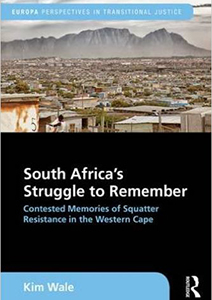Three scholars. Three books. One research unit.
Two post-doctoral fellows and a PhD student from Trauma, Forgiveness and Reconciliation (TFR) Studies at the University of the Free State (UFS) have each achieved author-status. During December 2015, Drs Samantha van Schalkwyk and Kim Wale, as well as Naleli Morojele will have their books on the shelves.
Dr Van Schalkwyk, PhD in Psychology (UFS, 2014), is leading co-editor of the book A Reflexive Inquiry into Gender Research: Towards a New Paradigm of Knowledge Production & Exploring New Frontiers of Gender Research in Southern Africa. The book is a product of an international symposium she organised in 2013. Dr Van Schalkwyk has made prolific contributions during her three years at the UFS: speaking at two international conferences, and publishing her research in internationally-accredited peer-reviewed journals. In addition, she is also heading a major research project on Gender Reconciliation, based at the university.
Dr Wale is a graduate of the University of London with a PhD (2013) in post-conflict development. Her forthcoming book, South Africa's Struggle to Remember: Contested Memories of Squatter Resistance in the Western Cape is based on her doctoral research. Now that Dr Wale’s book is finished, she will be working with Prof Pumla Gobodo-Madikizela on the analysis of research data collected for a study on transformation – as well as resistance to it – in students’ residences.
 |
Naleli Morojele received her Master of Arts in African Studies in 2014 from the UFS. Her dissertation research was on women political leaders in post-conflict countries, with data collected in South Africa and Rwanda. The review comments on her thesis prompted her to consider turning her research into a book. She spent seven months on this project with support from a global network of mentors affiliated with TFR Studies. The product is the book, Women Political Leaders in Rwanda and South Africa: Narratives of Triumph and Loss. Morojele is currently a PhD candidate. Her study focuses on university women, and explores women’s gender identity in the post-apartheid context.
“I am very excited about the work that these young women have produced,” says Prof Gobodo-Madikizela. “Dr Van Schalkwyk has already been invited by Palgrave Macmillan to consider a contract with the publisher to turn her PhD thesis into a book. It is going to be a very busy and productive year for her.”
A bumper book launch in mid-January 2016 is in the pipeline.